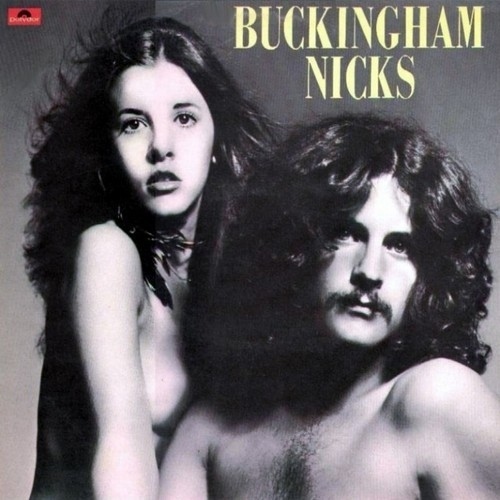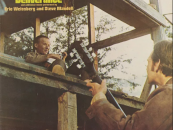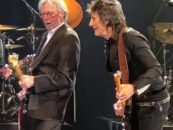Before They Were Stars: More Early Recordings From Rockers
by Gene Sculatti
1973’s Buckingham Nicks album is long out-of-print
This marks the third installment of our examination of the early recordings of classic rockers. The current batch includes a gaggle of garage-rockers, folkie gals and soul men, who later went on to far greater things.
For part one with pre-Eagles/Byrds/Simon & Garfunkel, and more, go here. And for part two with songs by Joe Cocker, pre-Led Zeppelin, pre-Doobie Brothers, and more, click here.
This article was written with Ken Barnes.
FLEETWOOD MAC
Lindsey Buckingham and Stevie Nicks: Sincerely, San Jose, “You Don’t Get Young Anymore,” 1968
Bob Welch: Seven Souls, “I’m No Stranger,” 1967
We could devote this entire list to early works of Fleetwood Mac’s myriad members, but these will do just fine for starters. Buckingham and Nicks formed a band called Fritz in Burlingame, Calif., south of San Francisco. They recorded a single for a small label, and when they received their copies, they discovered that the band was credited as Sincerely, San Jose—one of the worst-conceived band names this side of Yogi Phlegm, especially since the A-side of the single was a run-of-the-mill cover of Dionne Warwick’s “Do You Know the Way to San Jose.” The original flip side is much better, a bit like Jefferson Airplane backed by Question Mark and the Mysterians, and you can easily hear Buckingham’s familiar tones and, if you strain a little, discern Nicks in the background vocal mix.
Before he became a mainstay of Mac’s wilderness years, between the band’s Peter Green-led original U.K. success and the arrival of the Buckingham/Nicks combine, Welch played in an L.A. blue-eyed soul band called the Seven Souls, which made a couple of singles in the ’60s. This lounge-soul outing was produced by Larry Williams, the colorful character who had a hit with “Boney Moronie” and wrote “Slow Down” (as covered by the Beatles). “I’m No Stranger” has become a coveted record for soul collectors; in fact, getting hold of it and the Sincerely, San Jose single might set you back a couple grand.
CREEDENCE CLEARWATER REVIVAL
Golliwogs, “Fight Fire,” 1966
Creedence Clearwater Revival’s long winding road to riverboats, bayous and dead-end hamlets begins in the studios of Berkeley jazz label Fantasy Records. Having labored as Tommy Fogerty and the Blue Velvets and the Visions, the Bay Area quartet had no say in Fantasy’s decision to rename them the Golliwogs. Under any handle, this, their fifth flop single, remains a revered, Them-like garage classic.
FOREIGNER
Mick Jones: The State of Micky & Tommy, “With Love From 1 to 5,” 1967
Mick Jones played in Spooky Tooth and other U.K. bands before forming Foreigner in 1976, but before that he and partner Tommy Brown’s principal gig was writing songs for France’s top pop star, the late Johnny Hallyday. They also took the opportunity to record a few tracks of their own under various names, the best of which is this orchestral freakbeat number that psychedelically celebrates “clockwork oranges and a bird that sings” and, more avariciously, “jingle-jangle money.”
GUESS WHO
Randy Bachman: Chad Allan and the Reflections, “Tribute to Buddy Holly,” 1962
Burton Cummings: The Deverons, “She’s Your Lover,” 1965
By the time Canada’s most successful rock export disbanded in 1975, its two principal players had logged considerable mileage together and apart. Bachman’s Guess Who tenure commenced in 1962 with the band’s earliest incarnation as Chad Allan and the Reflections. Three years later, when the renamed band scored with “Shakin’ All Over,” Cummings signed on, exiting Winnipeg combo the Deverons.
Related: Randy Bachman talks about the early Guess Who and his love of the Beatles
SAMMY HAGAR
Samson & Hagar, “Reach Out for Me,” 1968
Before his first bout of prominence with Montrose in 1973, Sammy Hagar joined with fellow Inland Empire (umbrella term for the San Bernardino/Riverside, Calif., region) rocker Pete Samson for this orchestral pop number, which mixes a pinch of fuzz—provided by the backing band, the Peppermint Trolley Company—with a bucketful of strings. Both Hagar and Samson had previously played in area bands, and Samson was actually better known at the time. Not for long.
HEART
Ann Wilson and the Daybreaks, “I’m Gonna Drink My Hurt Away,” 1969
As the older sister in Heart, Ann Wilson got an early jump on recording, cutting two singles on a small Seattle-area label with her comrades the Daybreaks. “Drink” is the flip side of the second record, a bluesy number with a vocal that hints at Heart hits to come and an organ solo that doesn’t.
STEVE MILLER
Goldberg-Miller Blues Band, “The Mother Song,” 1965
Steve Miller’s initial attempt at forging a music career dates back to his Dallas adolescence, where he and high-school classmate Boz Scaggs formed a series of rock bands. But his efforts didn’t really pay off until he migrated to Chicago and joined that city’s mid-’60s blues renaissance. There, he and organist Barry Goldberg teamed up for one raucous single. Goldberg sings and Miller tears off an incendiary mid-song solo.
TOM PETTY
Mudcrutch, “Up in Mississippi,” 1971
What’s widely assumed to be Petty’s primary influence (Byrds-ian mid-’60s rock) had not yet risen to the surface when he and his band Mudcrutch cut their debut single. The record is very much a product of its time, sporting a guitar solo suggestive of the Allmans’ Dickey Betts and Petty delivering a laconic, Jerry Garcia-ish vocal. Criteria Studios’ Ron Albert, later celebrated for his work with the Bee Gees, Eagles, and Derek and the Dominos, produced.
CARLY SIMON
Simon Sisters, “Chicken Road,” 1964
Carly Simon’s first recordings were in partnership with her older sister, Lucy, in a folk duo that eventually recorded three albums. This doleful blues, a Tennessee Ernie Ford cover with a powerful solo vocal from Carly, isn’t typical of the material on their first album, which is mostly children’s songs and standard folkie duets. A couple of years later, Bob Dylan was excited about revamping his first album track “Baby Let Me Follow You Down” for Carly, but regrettably, it never came to pass.
THREE DOG NIGHT
Cory Wells: The Enemys, “Glitter and Gold,” 1966
As the house band at the Whisky a Go Go in the mid-’60s, the Enemys had the means, motive and opportunity to befriend any number of music-biz luminaries. This single, written by Barry Mann and Cynthia Weil during their social-protest period (“Kicks,” “We Gotta Get Out of This Place”), was produced by Tom Wilson, whose credits include “Like a Rolling Stone,” “The Sound of Silence” and the Mothers’ Freak Out! album.
Danny Hutton: Basil Swift and the Seegrams, “Farmer’s Daughter,” 1965
Nineteen-sixty-five was a busy year for Danny Hutton. By the end of the year, the Irish emigrant/studio singer had issued three 45s on two different labels, including his only pre-Dog Billboard charter, “Roses and Rainbows.” Released that February under a pseudonym, Hutton’s debut was his cover of a Brian Wilson composition that had initially appeared on the Beach Boys’ Surfin’ Safari album.
Chuck [Negron] Rondell: “All’s Fair in Love and War,” 1964
As a teenager, the New York native had sung in local doo-wop groups and even performed at the Apollo Theater, but it wasn’t until he moved to California that his recording career began in earnest. Three years before the Dogs let him in, he cut an innocuous pop rocker for Columbia, arranged by future Bread-winner David Gates.
Reminder: part one with pre-Eagles/Byrds/Simon & Garfunkel, and more, go here. And for part two with early recordings by such rockers as Joe Cocker, pre-Led Zeppelin, pre-Doobie Brothers, and more, click here.






4 Comments so far
Jump into a conversationBCB – The bit on on Lindsey Buckingham and Stevie Nicks’ early band Fritz is interesting, but not the real story. The Buckingham Nicks album – which you tease the entire story with – is the far bigger, long lost treasure. Recorded before the duo joined Fleetwood Mac, and enlisting A-list session players such as Waddy Wachtel – the BN album is a 40-minute masterpiece. It’s almost impossible to find – Lindsey owns the rights and never released them, therefore it’s not on Spotify or even CD (I treasure my vinyl copy even though I no longer own a turntable). Landslide made it to their first record with Fleetwood Mac, but Frozen Love isn the opus, the forerunner to Go Your Own Way. Only 8 songs, but each a gem.
You could buy B/N years ago in the bargain CD bins for 7.98
You also could have gotten all you wanted of Elvis Gold Records on CD in “electronic stereo” for $5.99 . . . that’s also a collector’s item now.
Just for clarification, Chad Allan and The Reflections became Chad Allan and The Expressions by the time “Shakin’ All Over” hit. That single was sent out with the band credit of “Guess Who?”, as the record company was trying to create some buzz with the song, trying to make people think they were one of those new British invasion bands. Or something like that. Anyway, they tried to go back to being Chad Allan and The Expressions, but too many jocks around the country were already calling them “Guess Who” because that’s what was on the record label. So by the end of ’65, that’s what they changed their name to.
OK, avid collector of the absurd and unusual. Where can we get these songs? Also eps 2 & 3